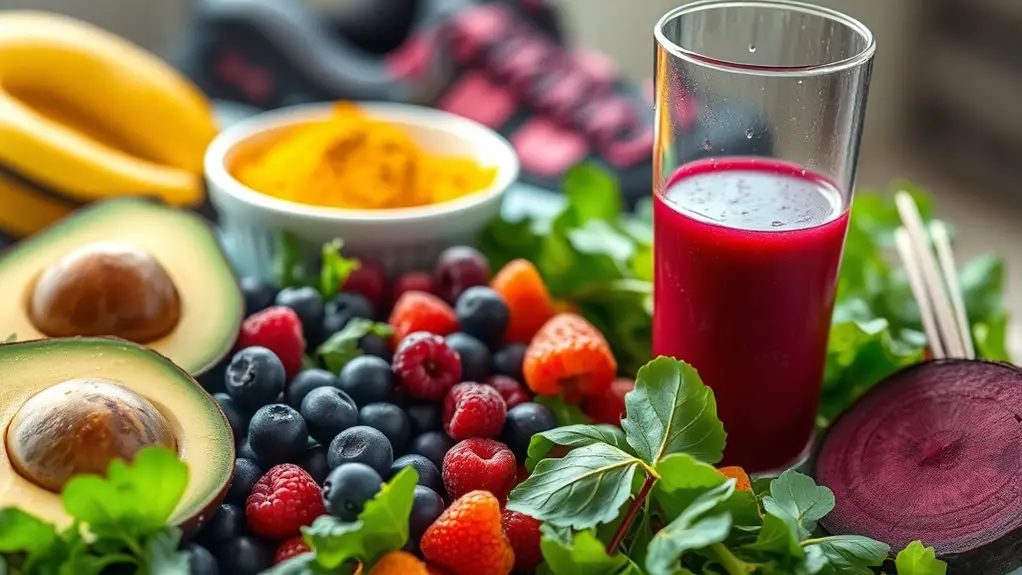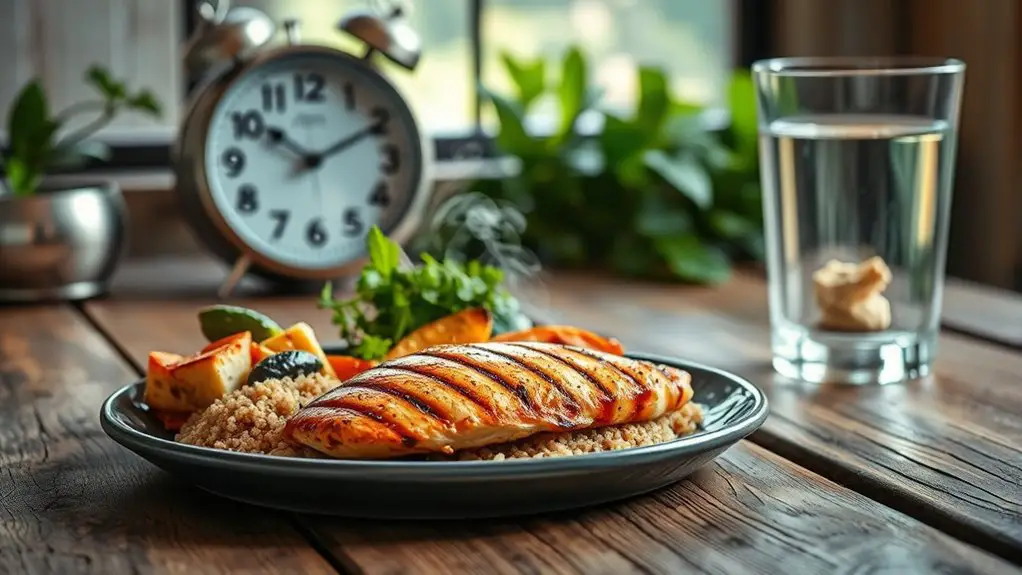Anti-inflammatory foods play a significant role in your sports recovery by reducing inflammation and promoting muscle healing. Foods like berries, leafy greens, fatty fish, and nuts contain antioxidants and omega-3 fatty acids that combat oxidative stress and support tissue repair. Including these foods in your post-workout meals can enhance your recovery process, helping you bounce back faster and perform better. Discover how to create a balanced meal plan with these powerful foods for ideal recovery.
The Importance of Nutrition in Sports Recovery
When you push your body to its limits during sports, it's easy to overlook the essential role nutrition plays in recovery. You might feel invincible in the moment, but the right nutrients are vital to bounce back stronger. Fueling your body with quality food not only helps repair muscle damage but also replenishes the energy you've burned. It's about more than just satisfying hunger; it's about giving your body what it needs to thrive.
Think of nutrition as your best ally in the pursuit of freedom and performance. Whole foods rich in vitamins, minerals, and antioxidants can boost your recovery process and keep you feeling agile. Don't just grab any snack; choose wisely to support your journey. By prioritizing nutrition, you're investing in your body's ability to recover, so you can release your full potential on the field, court, or track. Remember, freedom comes with responsibility—nourish yourself right! Adequate protein intake is crucial for repairing damaged muscles and enhancing performance in future workouts.
Understanding Inflammation and Its Impact on Athletes
Inflammation is your body's natural response to injury or stress, but it can also hinder your performance as an athlete. Understanding how inflammation affects recovery time and overall athletic performance is vital for optimizing your training. By addressing inflammation through diet and lifestyle, you can enhance your recovery and get back to performing at your best.
What Is Inflammation?
In the world of sports, understanding inflammation is essential for optimizing recovery and performance. Inflammation is your body's natural response to injury, infection, or stress. When you push your limits, tiny tears occur in your muscles, triggering an inflammatory response. This process helps repair damaged tissues, but it can also lead to discomfort and fatigue if it lingers too long.
You might not realize it, but chronic inflammation can hinder your progress, keeping you from reaching your peak. It's vital to recognize the balance between beneficial and harmful inflammation. By incorporating anti-inflammatory foods into your diet, you can support your body's healing process, reduce unnecessary inflammation, and ultimately enhance your overall athletic experience.
Effects on Athletic Performance
Understanding how inflammation affects your athletic performance can be a game-changer. When your body's inflamed, it can slow you down, impairing strength, speed, and endurance. You might feel fatigued or struggle with recovery, making it tough to hit your peak. Knowing this, it's essential to manage inflammation effectively.
| Positive Effects | Negative Effects |
|---|---|
| Improved recovery time | Decreased strength |
| Enhanced endurance | Reduced agility |
| Better muscle repair | Increased fatigue |
| Optimized training | Higher injury risk |
Incorporating anti-inflammatory foods into your diet can help reduce those negative impacts. By choosing the right foods, you can fuel your performance and embrace the freedom to push your limits.
Recovery Time and Inflammation
When you push your body to the limit, it's natural for inflammation to kick in as part of the recovery process. This reaction is vital, but it can also slow you down. Understanding inflammation helps you manage your recovery time effectively.
To optimize your healing, consider these key points:
- Inflammation is a response to muscle strain and injury.
- Chronic inflammation can lead to extended recovery times and decreased performance.
- Anti-inflammatory foods can help reduce inflammation and speed up recovery.
- Hydration plays an important role in supporting your body's healing processes.
Top Anti-Inflammatory Foods to Include in Your Diet
When it comes to recovery, certain foods can really make a difference. Berries and cherries are packed with antioxidants that help reduce inflammation, while leafy greens provide essential nutrients for healing. Incorporating these into your diet can boost your recovery process and improve your overall performance.
Berries and Cherries
Berries and cherries are among the most powerful anti-inflammatory foods you can add to your diet for ideal sports recovery. These vibrant fruits not only taste great, but they also help reduce inflammation and oxidative stress in your body. Including them in your meals can boost your recovery process and enhance your performance. Here's why you should savor them:
- Rich in antioxidants, fighting off free radicals
- High in vitamins C and K, supporting immune function
- Packed with fiber, aiding digestion and gut health
- Low in calories, making them a guilt-free snack
Leafy Greens Benefits
While you might not think of leafy greens as a go-to snack, incorporating these nutrient-dense foods into your diet can greatly aid your sports recovery. Packed with vitamins, minerals, and antioxidants, leafy greens like spinach, kale, and Swiss chard help reduce inflammation and promote healing. They're low in calories, making them perfect for fueling your body without weighing you down.
Adding these greens to smoothies, salads, or stir-fries can enhance your meals and boost recovery. Plus, their high fiber content supports digestion, ensuring your body absorbs all those essential nutrients. So, embrace the freedom of experimenting with different leafy greens, and watch as your recovery accelerates, helping you get back to the activities you love with renewed energy.
How Berries Enhance Recovery and Reduce Soreness
If you're looking for natural ways to speed up your recovery after intense workouts, incorporating berries into your diet can make a significant difference. Packed with antioxidants and anti-inflammatory properties, berries help reduce soreness and promote healing.
Consider adding these berry benefits to your routine:
- Rich in antioxidants: Berries like blueberries and strawberries combat oxidative stress from exercise.
- Anti-inflammatory properties: They help lower inflammation, giving your muscles a faster chance to recover.
- Natural sugars: Berries provide a quick energy boost without the crash, perfect for post-workout snacks.
- Hydration: High water content in berries aids in hydration, essential for recovery. Additionally, proper hydration strategies can further enhance your overall recovery process.
The Role of Fatty Fish in Healing and Performance
Incorporating fatty fish into your diet can greatly enhance your recovery and overall performance. Rich in omega-3 fatty acids, fatty fish like salmon and mackerel help reduce inflammation and promote muscle healing after intense workouts. Eating these nutrient-dense foods can support your body's natural healing processes, allowing you to bounce back faster and train harder. Additionally, proper nutrition strategies play a vital role in enhancing recovery and should be considered alongside the benefits of fatty fish.
| Benefits of Fatty Fish | Examples of Fatty Fish |
|---|---|
| Reduces inflammation | Salmon |
| Supports muscle recovery | Mackerel |
| Improves joint health | Sardines |
Leafy Greens: Nutrient Powerhouses for Recovery
Fatty fish are just one piece of the puzzle when it comes to optimizing recovery. Leafy greens play an essential role too, packing a punch of nutrients that can help you bounce back after a tough workout. These vibrant veggies are rich in antioxidants, vitamins, and minerals that reduce inflammation and boost your overall health. Adding them to your meals can supercharge your recovery process. Here's what to look for:
- Spinach: Loaded with iron and vitamins A, C, and K.
- Kale: A powerhouse of antioxidants that support immune function.
- Swiss Chard: High in magnesium, crucial for muscle recovery.
- Arugula: Offers anti-inflammatory compounds that can ease soreness.
Incorporating these leafy greens into your diet not only enhances recovery but also keeps you feeling energized and ready for your next challenge. Hydration is key after workouts, so pair your greens with plenty of water and nutrient-rich meals! So, get creative and let those greens shine in your meals!
Nuts and Seeds: Small But Mighty Anti-Inflammatory Options
While you might think of fruits and vegetables as the stars of your recovery diet, nuts and seeds are small but mighty contenders that shouldn't be overlooked. They're packed with healthy fats, proteins, and essential nutrients that can help reduce inflammation and promote healing. Almonds, walnuts, and chia seeds, for instance, are rich in omega-3 fatty acids, which are known for their anti-inflammatory properties.
Incorporating these snacks into your routine can be simple and enjoyable. You could sprinkle chia seeds on your smoothie, toss nuts into your salads, or grab a handful for a quick energy boost. Beyond just their nutritional benefits, nuts and seeds also provide a satisfying crunch and flavor that can elevate your meals. So, don't shy away from these powerhouse foods. They can play a crucial role in your recovery, helping you bounce back quicker and feel more energized.
Creating a Balanced Recovery Meal Plan With Anti-Inflammatory Foods
To optimize your recovery from sports activities, creating a balanced meal plan that emphasizes anti-inflammatory foods is essential. This way, you'll support your body in healing while feeling energized and free to pursue your passion. Here are some key components to include:
- Fruits and Vegetables: Load up on berries, leafy greens, and sweet potatoes for antioxidants and vitamins.
- Whole Grains: Choose quinoa, brown rice, or oats to provide sustained energy and fiber.
- Healthy Fats: Incorporate avocados, olive oil, and fatty fish like salmon for omega-3s that reduce inflammation.
- Lean Proteins: Opt for poultry, beans, or legumes to aid in muscle repair and recovery.
Frequently Asked Questions
Can Anti-Inflammatory Foods Replace Traditional Sports Recovery Supplements?
You might wonder if anti-inflammatory foods can truly replace traditional sports recovery supplements. While they offer natural benefits, they're best used alongside supplements for peak recovery. Balance is key to achieving your performance goals.
How Soon After Exercise Should I Eat Anti-Inflammatory Foods?
You should eat anti-inflammatory foods within 30 minutes to two hours after exercise. This timing helps reduce inflammation and supports recovery, letting you get back to your activities feeling rejuvenated and ready to conquer challenges.
Are There Any Side Effects of Consuming Too Many Anti-Inflammatory Foods?
Consuming too many anti-inflammatory foods can lead to digestive issues, nutrient imbalances, and potential interactions with medications. It's essential to maintain moderation, balance your diet, and listen to your body's needs for true freedom in wellness.
Can I Mix Anti-Inflammatory Foods With Other Dietary Approaches?
Absolutely, you can mix anti-inflammatory foods with other dietary approaches. It's all about balance. Embrace variety, letting your body benefit from different nutrients while enjoying the freedom to explore diverse flavors and culinary experiences.
How Do Individual Dietary Needs Affect Anti-Inflammatory Food Choices?
Your individual dietary needs shape your anti-inflammatory food choices. If you're lactose intolerant, for instance, you'll avoid dairy. Listening to your body helps you find what works best for you, promoting overall wellness and freedom in your diet.




